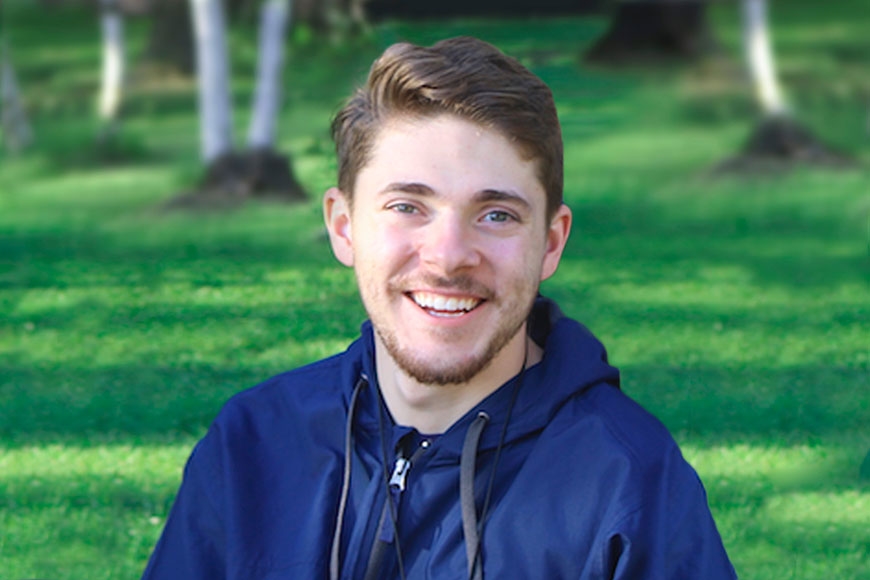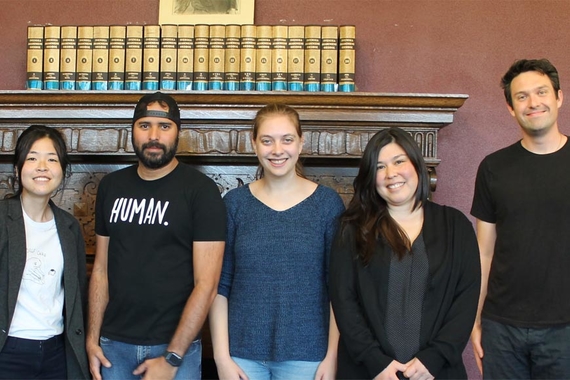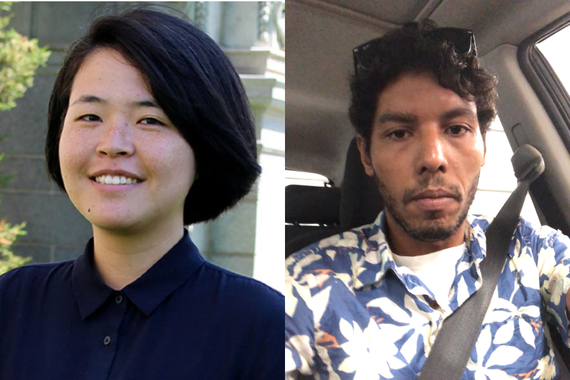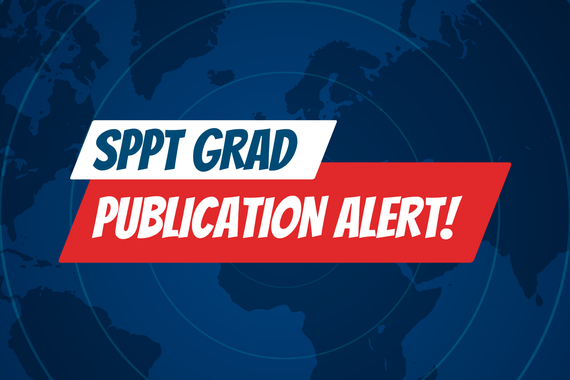Three Opportunities Abroad
Joseph Rojas learned abroad in three countries and three languages. He discusses how his experiences in Brazil, Venezuela, and France informed his career path.
Majors: global studies, Spanish-Portuguese studies, French studies
Graduated: May 2018
Studied abroad in: Brazil (summer 2015, 2 months); Venezuela (fall 2015, 4 months); France (spring 2017, 4 months)
How did you choose your programs?
I came to the University of Minnesota in part because I would be able to study Portuguese and because it is one of the few universities that had a study abroad program in Venezuela.
I applied my first year for a US Department of Education Foreign Language and Area Studies (FLAS) fellowship through the Institute for Global Studies, which funded my two months of intensive language study through the ISA program in Florianópolis, Brazil. I went to Mérida, Venezuela immediately after that and spent the fall semester there. My first ever Spanish teacher had studied there as a Rotary Youth Exchange student and inspired me to go there myself. Additionally, the program was dwindling due to the economic and political crises in Venezuela and I wanted to seize the opportunity while I still could.
I subsequently received the Margaret J. Talle Study Abroad Scholarship through the Department of French & Italian. The scholarship stipulated that I had to study in France and I ended up taking courses at the IES Center and the Université de Nantes. Largely, my decisions were about being able to fully fund a study abroad experience in a desired location and on a program that made sense for my majors and would fulfill requirements.
In addition to the scholarships I mentioned, University financial aid and the First Generation/Financial Need Study Abroad Scholarship made my learning abroad experiences possible. My scholarship support gave me peace of mind, allowing me to treat myself to experiences I may have turned down for financial reasons, such as taking short-term trips within each country, which I believe helped me better understand my host countries.
What were your learning abroad experiences like?
In each case, I did all of my coursework in the target language and lived with a host family. In Brazil, at the Universidade do Sul de Santa Catarina, I took courses in Portuguese and went on-site visits in the host city and short trips to places in the state of Santa Catarina. I also spent a couple of weekends on personal travel.
In Venezuela, I studied at VEN-USA, an institute for foreign language study where Venezuelans could study English and where UMN students could study Spanish and take other courses to fulfill major and graduation requirements. Furthermore, witnessing the effects of an economic crisis, being present for the consequential election while I was there, and being on a program as an 18-year-old with mostly older students were tremendous sources of personal growth and influenced later decisions to pursue internships or explore certain areas of study.
Lastly, I traveled for three weeks in Spain prior to going to France, spent six weeks in Norway, visited a fellow global studies major in Morocco, and took a few shorter term trips. My experience in France took place the semester after the 2016 election, and I walked into yet another contentious election when I arrived.
Do you have a favorite memory from your time abroad?
In Brazil, I remember being in finals week and watching a movie in Portuguese with my host family and thinking to myself how relaxed and at ease I felt. I wasn't struggling with Portuguese, I was comfortable with my host family, and more or less felt I had adjusted by the end of my two months.
In Venezuela, I can remember all the trips that I took with my cohort of eight UMN students, and especially the relationships we made with the Venezuelan tour guide and the bus driver and some of the young VEN-USA teachers at our school.
In France, I have a lot of fond memories of eating kebabs and tarte au caramel, lingering at the dinner table with my host family, getting better at chiming in, and spending time with a couple of closer friends I made.
What is something you found challenging about your immersion experience?
When I was in France, I had a lot of arbitrary expectations. The US romanticizes France and Europe in general in a way that doesn’t match up with what I experienced. I loved the higher standard of living, the slower pace of life, some aspects of cultural, social, and political life, and some of the food, but being in France felt like being in an older, French-speaking version of my home. I had also studied abroad twice before that and had rather transformative experiences that I could then compare with what I was experiencing in France. In Brazil and Venezuela, the cultures and the people were much warmer and more welcoming. It felt like I had immediate friends in a lot of social interactions even if it didn't materialize into anything, whereas it is incredibly difficult to penetrate French people's well-established social circles—especially in just four months.
How has immersing yourself in another language and culture changed the way you approach the world?
I started learning Spanish because I wanted to reconnect with my Puerto Rican heritage and soon discovered how passionate I was about learning the language and the possibilities for communication it would give me. It seems like even my own personality shifts when I am speaking other languages; that I adopt the culture in some interesting ways in addition to simply changing the sounds that come out of my mouth.
Studying in Brazil and Venezuela gave me a much deeper understanding of the region of the world I was focusing on for my global studies major and provided fodder for more constructive conversations about stereotypes about those countries and Latin America as a region.
I loved Brazil and Portuguese studies so much that I applied for the Fulbright and am currently in Sobral, Ceará, Brazil as a Fulbright English Teaching Assistant at the Universidade Estadual do Vale Acaraú. My semester in Venezuela spurred me to work as a refugee and immigrant program intern for the Advocates for Human Rights in Minneapolis, which helped me get a job as a multilingual legal assistant at a law firm in Minneapolis called Wilson Law Group.
Lastly, as a queer person, it has been a beautiful experience to see how all these different languages and cultures approach gender and sexuality, and to compare the commonalities and differences. I have a far greater appreciation for my own identity and feel an immense sense of transnational solidarity among queer individuals as a result of my study.
How did your learning abroad experience connect with your studies back on campus?
My learning abroad experiences connected directly to my studies on campus. Receiving a FLAS fellowship was the only way I would have had the time or funds to study in Brazil and served as a great foundation for the subsequent advanced electives I took in the department. All of my coursework in Venezuela and France counted toward my majors.
Studying abroad contributed to my ability to express myself in the target languages and provided a depth of knowledge in my fields. It also supplied personal experiences that influenced what I wrote papers about, did projects on, and where I looked for jobs or internships.
How does understanding another language and culture give you an advantage in the workplace?
The connections between my language study and learning abroad experiences and my career are direct and tangible. My first job out of undergrad was as a multilingual legal assistant. I was required to speak fluent Spanish, and the attorney who interviewed me had a Venezuelan husband and had studied in Venezuela while a student at UMN prior to learning Spanish herself. I know for a fact that that played a significant role in me getting the job.
Additionally, I don't know that I would have interned for the Advocates for Human Rights had I not studied in Venezuela. Nor would I have attained the same level of proficiency and cultural awareness necessary for working with immigrant populations. Furthermore, I was a huge asset to the law firm as the only French speaker in the office, and I most definitely would not have been capable of that had I not studied in France. Working in that context and being able to switch languages so that you're understood and that it makes cultural sense requires an extreme amount of adaptability and flexibility in addition to the language and culture component. Adaptability and flexibility are two of the greatest skills I learned as a result of studying abroad. I'm now working as an English Teaching Assistant in Brazil largely because I worked at multiple Concordia Language Villages camps, volunteer-tutored for language departments, and have shown myself able to succeed on an exchange program before.
What advice do you have for students who are thinking about studying abroad?
I think it's important to go into the experience with high hopes but without expectations. Most of what you imagine before going are misconceptions you've heard in unnuanced conversations about studying abroad or in advertising designed to entice you to do it, rather than how it actually is. You're signing up for an experience that is going to teach you a lot about another place, another culture, other people, and yourself. There will be growing pains and that's okay. Don't compare your experience to anyone else's, because there is no one way to study abroad.
This interview was conducted by an undergraduate student in CLAgency. Meet the team.



